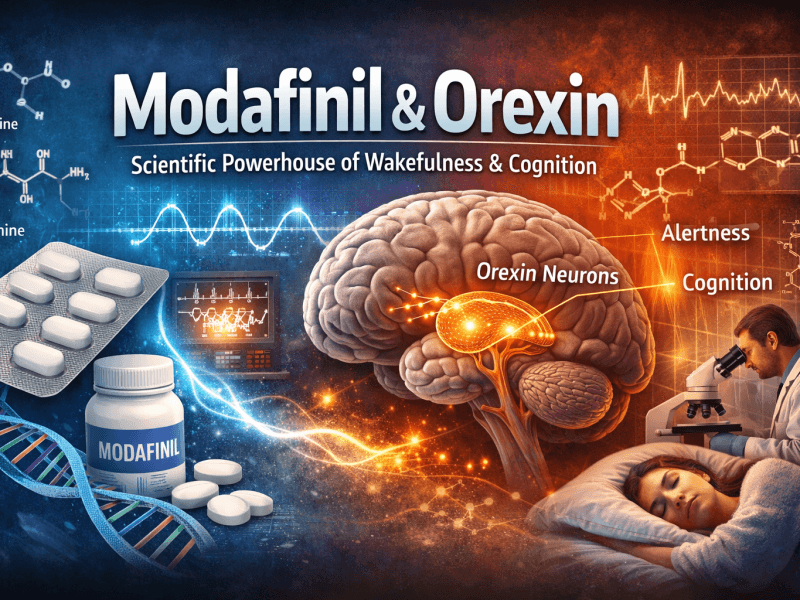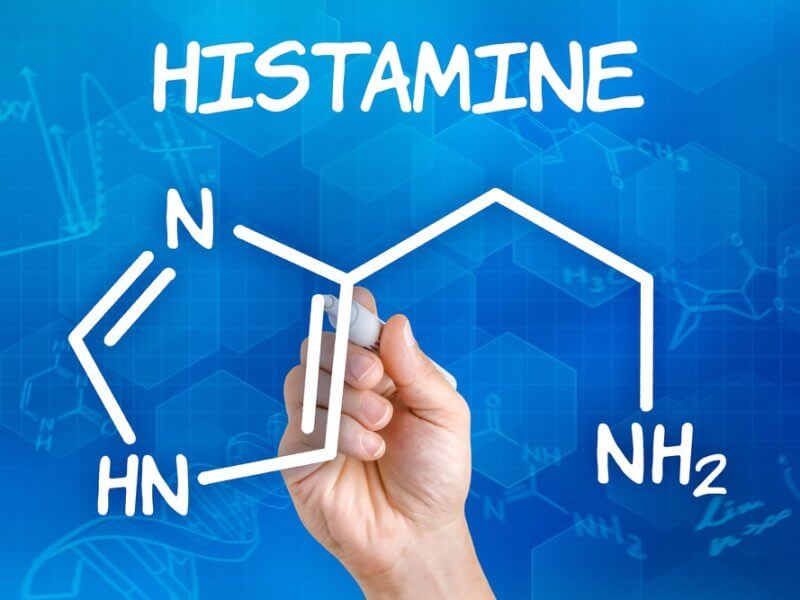Last Updated on 10/02/2026 by James Anderson
Introduction: Beyond Wakefulness – Modafinil’s Neuroplastic Potential
While Modafinil is primarily known as a wakefulness-promoting agent prescribed for narcolepsy and sleep disorders, emerging research suggests its effects extend far beyond keeping people awake. The central question driving contemporary neuroscience inquiry is whether Modafinil can influence neuroplasticity the brain’s fundamental ability to reorganize its structure, functions, and connections in response to learning, experience, or injury. This comprehensive review examines the current scientific understanding of how Modafinil interacts with the brain’s plastic systems, separating established pharmacological facts from promising hypotheses and speculative claims.
Understanding Neuroplasticity: The Brain’s Adaptive Framework
Defining Neuroplasticity
Neuroplasticity refers to the nervous system’s capacity to change its activity in response to intrinsic or extrinsic stimuli by reorganizing its structure, functions, or connections. This adaptive capability occurs throughout the lifespan, contrary to earlier beliefs that the adult brain was fixed and unchangeable. Neuroplastic changes form the biological basis for learning, memory, recovery from injury, and adaptation to environmental demands.
Types and Mechanisms of Neuroplasticity
Neuroplasticity manifests through several interconnected mechanisms:
- Structural Plasticity: Physical changes in neural architecture, including synaptogenesis (formation of new synapses), dendritic branching, and neurogenesis (creation of new neurons, primarily in the hippocampus).
- Functional Plasticity: The brain’s ability to move functions from damaged areas to undamaged areas, such as when stroke survivors relearn skills using different neural pathways.
- Synaptic Plasticity: Activity-dependent changes in synaptic strength, including long-term potentiation (LTP) and long-term depression (LTD), which are considered cellular correlates of learning and memory.
- Homeostatic Plasticity: The brain’s global mechanisms to maintain stability of neural activity despite changes in input or experience.
These processes are regulated by neurotrophic factors (particularly Brain-Derived Neurotrophic Factor, BDNF), neurotransmitter systems, gene expression, and environmental enrichment.
Modafinil’s Pharmacological Action: A Multi-System Approach
Mechanism of Action Beyond Simple Stimulation
Unlike traditional stimulants that primarily act through massive monoamine release, Modafinil exhibits a more nuanced and targeted pharmacological profile. Its wakefulness-promoting effects result from actions on multiple neurotransmitter systems:
- Dopamine Transporter Inhibition: Modafinil binds to and inhibits the dopamine transporter (DAT), increasing extracellular dopamine levels particularly in the striatum and nucleus accumbens, though with lower potency than amphetamines. This action correlates with enhanced motivation, attention, and executive function.
- Norepinephrine Enhancement: By increasing extracellular norepinephrine in cortical and hypothalamic regions, Modafinil promotes arousal, vigilance, and stress response modulation.
- Histamine Activation: Modafinil increases histamine release in the hypothalamus, contributing significantly to wakefulness through the tuberomammillary nucleus projections.
- Orexin System Modulation: Evidence suggests Modafinil may activate orexin (hypocretin) neurons in the lateral hypothalamus, which play crucial roles in stabilizing wakefulness and regulating arousal.
- GABA and Glutamate Balance: Some studies indicate Modafinil may decrease GABAergic transmission while increasing glutamatergic activity in certain brain regions, potentially shifting the brain toward a more plastic, excitable state conducive to learning.
Comparison of Modafinil with Other Cognitive Enhancers
| Agent | Primary Mechanism | Effect on Neuroplasticity Markers | Clinical Applications | Risk Profile |
|---|---|---|---|---|
| Modafinil | DAT inhibition, multi-system modulation | Increases BDNF, enhances LTP in preclinical models | Narcolepsy, SWSD, OSA, investigational for ADHD, depression | Low abuse potential, generally well-tolerated |
| Methylphenidate | Potent DAT and NET inhibition | Mixed effects on plasticity; can enhance learning but may impair long-term adaptations | ADHD, narcolepsy | Moderate abuse potential, cardiovascular concerns |
| Amphetamines | Monoamine release and reuptake inhibition | May induce structural changes but with potential neurotoxicity at high doses | ADHD, narcolepsy | High abuse potential, significant side effects |
| Donepezil | Acetylcholinesterase inhibition | May enhance cortical plasticity, particularly in aging brain | Alzheimer’s disease, dementia | Cholinergic side effects, generally low abuse potential |
| Natural Nootropics (Lion’s Mane) | Various, often BDNF enhancement | Moderate enhancement of neurogenesis and BDNF | General cognitive support, mild enhancement | Very low risk, subtle effects |
Scientific Evidence: Does Modafinil Truly Enhance Neuroplasticity?
Preclinical Research in Animal Models
Animal studies provide the most direct evidence for Modafinil’s effects on neuroplasticity:
- Hippocampal Neurogenesis: Several rodent studies demonstrate that Modafinil administration increases cell proliferation in the hippocampal dentate gyrus, a key region for learning and memory. These effects appear dose-dependent and may be mediated through BDNF upregulation.
- Synaptic Plasticity Enhancement: Research indicates Modafinil enhances long-term potentiation (LTP) in hippocampal slices, suggesting it facilitates synaptic strengthening, a cellular correlate of learning.
- Neurochemical Markers: Modafinil increases expression of plasticity-related proteins including BDNF, CREB, and synapsin I in various brain regions, particularly under conditions of sleep deprivation or cognitive challenge.
- Recovery from Brain Injury: Animal models of stroke and traumatic brain injury show improved functional recovery with Modafinil treatment, potentially through enhanced compensatory plasticity in perilesional areas.
Human Neuroimaging and Cognitive Studies
Human evidence is more indirect but increasingly supportive:
- Functional Connectivity Changes: fMRI studies demonstrate that Modafinil alters functional connectivity between brain networks involved in cognitive control, particularly enhancing communication between the default mode network and frontoparietal control network.
- Cognitive Flexibility Enhancement: Multiple double-blind, placebo-controlled trials show Modafinil improves performance on tasks requiring cognitive flexibility, attentional set-shifting, and complex problem-solving cognitive domains heavily reliant on neuroplastic adaptation.
- Sleep-Deprivation Counteraction: Modafinil uniquely preserves neuroplastic capacity during sleep deprivation, a state that normally impairs synaptic plasticity and memory consolidation.
- Clinical Populations: Studies in patients with depression, schizophrenia, and attention-deficit disorders show Modafinil can enhance cognitive functions that are typically impaired in these conditions, possibly through normalization of aberrant neural circuits.
Limitations and Gaps in Current Research
Despite promising findings, important limitations exist:
- Most human studies assess acute rather than chronic administration
- Long-term effects on structural brain changes remain largely unknown
- Individual differences in response are pronounced but poorly understood
- Most research examines Modafinil’s effects on the expression of plasticity rather than its induction
Clinical Applications: Modafinil in Neurorehabilitation and Cognitive Disorders
Stroke and Traumatic Brain Injury Recovery
Increasing evidence supports Modafinil’s role in neurorehabilitation:
- Fatigue Management: Post-stroke fatigue affects 30-70% of survivors and significantly impedes rehabilitation. Modafinil effectively reduces this fatigue, enabling greater participation in therapy.
- Cognitive Rehabilitation: Early trials suggest Modafinil may enhance the effects of cognitive rehabilitation by increasing engagement, attention during therapy sessions, and consolidation of relearned skills.
- Aphasia Recovery: Preliminary studies indicate potential benefits in post-stroke aphasia when combined with speech therapy, possibly by enhancing neural reorganization in language networks.
Neurodegenerative and Neuropsychiatric Conditions
Modafinil shows promise in several conditions characterized by impaired neuroplasticity:
- Depression and Cognitive Dysfunction: Beyond its wakefulness effects, Modafinil may help reverse cognitive deficits in depression, particularly in executive function, possibly by normalizing prefrontal cortical activity and enhancing monoamine transmission.
- Schizophrenia Cognitive Deficits: Adjunctive Modafinil may improve working memory, attention, and executive function in some patients with schizophrenia, potentially by enhancing prefrontal dopamine signaling without exacerbating psychosis.
- Multiple Sclerosis-Related Fatigue: As an effective treatment for MS fatigue, Modafinil may indirectly support neuroplasticity by enabling patients to engage more fully in physical and cognitive activities that promote brain health.
The Neuroplasticity Paradox: Enhancement vs. Interference
State-Dependent Effects on Learning
A critical consideration is Modafinil’s state-dependent effects on neuroplasticity:
- Facilitation Under Suboptimal Conditions: Modafinil appears most effective at enhancing learning and plasticity when baseline cognitive function is impaired by sleep deprivation, fatigue, or neurological conditions.
- Variable Effects in Healthy, Rested Individuals: In optimal conditions, Modafinil’s effects on learning and plasticity may be more modest and task-dependent, potentially enhancing some forms of learning while interfering with others.
- Timing Considerations: Evidence suggests Modafinil may enhance the encoding (acquisition) phase of learning more than consolidation, which depends heavily on sleep-related processes that Modafinil might disrupt if taken late in the day.
Interaction with Sleep-Dependent Plasticity
This represents a significant paradox in Modafinil’s potential as a neuroplasticity enhancer:
- Acute Benefits vs. Long-Term Costs: While Modafinil can maintain cognitive function during sleep deprivation, chronic use without adequate sleep may ultimately impair the sleep-dependent consolidation of learning and synaptic homeostasis.
- Sleep Architecture Alterations: Modafinil reduces slow-wave and REM sleep, stages critical for memory consolidation and synaptic pruning, potentially interfering with natural plasticity processes.
- Strategic Use Recommendations: For optimal neuroplasticity benefits, Modafinil should likely be used strategically rather than continuously, with careful attention to preserving sleep quality and duration.
Ethical Considerations and Future Directions
Neuroenhancement Ethics
The potential use of Modafinil as a neuroplasticity enhancer raises several ethical questions:
- Authenticity and Achievement: Does pharmacological enhancement of neuroplasticity undermine the authenticity of skills and knowledge acquired with its assistance?
- Equity and Access: If Modafinil genuinely enhances learning capacity, would unequal access create or exacerbate cognitive disparities?
- Medicalization of Enhancement: Should we medicalize cognitive enhancement for healthy individuals, and what are the societal implications of widespread use?
Future Research Priorities
Several key questions warrant further investigation:
- Optimal Dosing Protocols: Research should establish whether intermittent, low-dose, or context-dependent administration produces superior neuroplasticity outcomes compared to continuous use.
- Combination Approaches: Studies exploring Modafinil combined with behavioral interventions (cognitive training, physical exercise, environmental enrichment) may reveal synergistic effects on neuroplasticity.
- Individual Differences: Research identifying biomarkers predictive of neuroplastic response to Modafinil could enable personalized approaches.
- Long-Term Structural Effects: Longitudinal neuroimaging studies are needed to determine whether chronic Modafinil use produces measurable changes in brain structure and connectivity.
Practical Guidelines for Responsible Use
Maximizing Potential Benefits While Minimizing Risks
For those considering Modafinil to support cognitive goals:
- Medical Supervision: Always use under medical guidance, with regular monitoring of effects and side effects.
- Sleep Preservation: Maintain rigorous sleep hygiene, using Modafinil early in the day and never as a substitute for adequate sleep.
- Active Engagement: Combine Modafinil with cognitively demanding activities or learning experiences rather than passive consumption.
- Cyclical Use: Consider intermittent rather than daily administration to minimize tolerance and preserve natural neuroplasticity mechanisms.
- Holistic Approach: Integrate Modafinil within a broader framework of brain-healthy practices including exercise, nutrition, stress management, and cognitive stimulation.
FAQ
Can Modafinil actually rewire my brain for better learning?
Current evidence suggests Modafinil can create a neurochemical environment conducive to neuroplasticity, particularly under suboptimal conditions like fatigue or neurological impairment. It enhances attention, cognitive control, and motivation factors that facilitate learning and preclinical studies show it increases neurogenesis and synaptic plasticity markers. However, it doesn’t automatically rewire the brain; meaningful structural changes still require active engagement in learning experiences.
How does Modafinil compare to natural methods for enhancing neuroplasticity?
Modafinil produces more immediate and potent effects on the neurochemical systems supporting plasticity, particularly in impaired states. Natural methods like exercise, meditation, cognitive training, and nutrition work through different, often slower mechanisms but with fewer risks and side effects. An ideal approach might combine strategic Modafinil use with established lifestyle interventions for synergistic benefits.
Is there evidence that Modafinil helps recovery from brain injuries?
Yes, growing evidence supports Modafinil’s role in neurorehabilitation. It effectively treats post-stroke and post-TBI fatigue, enabling greater participation in rehabilitation. Some studies suggest it may enhance cognitive recovery when combined with therapy, potentially by increasing engagement during rehabilitation sessions and supporting compensatory neural reorganization. However, it should be considered an adjunct to, not a replacement for, comprehensive rehabilitation.
Can Modafinil be neurotoxic or harm brain plasticity with long-term use?
Current evidence suggests Modafinil has a favorable safety profile compared to traditional stimulants. Unlike amphetamines, it doesn’t appear to cause neurotoxicity at therapeutic doses. However, long-term effects on natural neuroplasticity processes particularly sleep-dependent memory consolidation remain unclear. Disrupting sleep architecture through late-day dosing may interfere with important plasticity mechanisms over time.
Conclusion
Modafinil represents a fascinating intersection between pharmacology and neuroscience, offering insights into how we might influence the brain’s plastic capacities. Current evidence suggests it creates a neurochemical environment favorable to neuroplasticity, particularly in states of impairment or suboptimal functioning. Its multi-system modulation of dopamine, norepinephrine, histamine, and orexin systems appears to enhance cognitive flexibility, attention, and motivation key facilitators of learning and adaptation.
However, important distinctions must be maintained: Modafinil facilitates rather than directly causes neuroplastic changes. Its effects are state-dependent, context-specific, and most pronounced when baseline function is compromised. The drug interacts complexly with sleep enhancing wakefulness and cognition while potentially interfering with sleep-dependent plasticity processes critical for long-term memory consolidation.
For clinical populations with neurological or psychiatric conditions characterized by impaired neuroplasticity, Modafinil offers legitimate therapeutic potential, particularly as an adjunct to rehabilitation and behavioral interventions. For healthy individuals seeking cognitive enhancement, the benefits must be weighed against ethical considerations, potential side effects, and unknown long-term consequences.
‼️ Disclaimer: The information provided in this article about modafinil is intended for informational purposes only and is not a substitute for professional medical consultation or recommendations. The author of the article are not responsible for any errors, omissions, or actions based on the information provided.
References:
- U.S. Food and Drug Administration. PROVIGIL. U.S. Department of Health and Human Services. https://www.accessdata.fda.gov/drugsatfda_docs/label/2015/020717s037s038lbl.pdf . 2015
- Ballon JS, Feifel D. A systematic review of modafinil: potential clinical uses and mechanisms of action. J Clin Psychiatry. 2006
- Bettendorf L, Sallanon-Moulin M, et al. Paradoxical sleep deprivation increases the content of glutamate and glutamine in rat cerebral cortex. Sleep. 1996
- Fuxe K, et al. Modafinil enhances the increase of extracellular serotonin levels induced by the antidepressant drugs fluoxetine and imipramine: a dual probe microdialysis study in awake rat. Synapse. 2005
- Mechanisms of modafinil: A review of current research. nih.gov. 2007
- PROVIGIL (modafinil) Tablets. FDA.GOV. 2010
- Oliva Ramirez A, Keenan A, Kalau O, Worthington E, Cohen L, Singh S. Prevalence and burden of multiple sclerosis-related fatigue: a systematic literature review. 2021.
- Ciancio A, Moretti MC, Natale A, Rodolico A, Signorelli MS, Petralia A. Personality Traits and Fatigue in Multiple Sclerosis: A Narrative Review. Journal of Clinical Medicine. 2023
- Mereu, M., Bonci, A., Newman, A. H., & Tanda, G. The neurobiology of modafinil as an enhancer of cognitive performance and a potential treatment for substance use disorders. . https://doi.org/10.1007/s00213-013-3232-4 . 2013


